#(( letha voice: O no ))
Explore tagged Tumblr posts
Text
OPEN FOR QUESTIONS, USE ASK SYSTEM.
CHARACTERS YOU CAN ASK:PIXY, LETHA
Pixy's character sheet:
Age:22-23
Orgin:Cascadia
Species:Human/"Undead"
Skin tone: White ash/"white"
Blue steel eyes
Height:6'1
"scent"(wth wrong with you people):Blood, BO,smoke
Voice claim:Larry "Pixy" Foulke(normal),Rimmy DownUnder(angry)
Personality:A S S H O L E...Unless he knows you well in which case he just won't talk because he knows he will just make things worse
Relationships: Views those like Zailyn and Art in a good light while viewing Daisy in a mostly negative light
Text: red
Ailments:Missing left arm(Shut up me this arm is stronger than any bionic), half blind, autism
Strengths:Willpower(Understatement)
Weakness:Can't really understand others issues
"Adictions":Smoking both physical and e-cigs, however only as a way to pass time. Also is really into fighting
Ocupation:Mercenary
Religion:none (You think I would bend my knee that easily?)
Hobbies: Reading, prepping weapons, spinning items(swords, guns, etc), making mixed drinks
Home: Cascadia
Feats:TOO MANY, but noticeable ones are willing himself back into existence after being erased as well as defeating multiple beings "higher than god"
Powers(for more info check here):Dimension hopping, functional immortality, possible speed and strength enhancements, being "invisible"(no literally everyone is just blind)
Stand:The World Without Borders
Weapons:check here
Themes:When calm:Abandon All V1/The Red Mist theme, Overdrive. When enraged:Abandon All V3
Music he listens to: Blackout, Fight Fire With Gasoline, Till I Collapse
Storys with Pixy:
VANDRA
TILL I COLLAPSE
AVALON
Audio log 1
Audio log 2
Misc characters(characters who dont visit the house when everyone else is there BUT exist):
LETHA
GWYN
Misc stories
17 notes
·
View notes
Text
when it rains - roman godfrey
roman godfrey x reader
title from the paramore song of the same name
notes: sorry if this kinda sucks! i started this while i was watching the episode, but didn’t finish it until a few days later, so it might not have the best flow. i hope you still like it though!! and even if you don’t feel free to lie to me 🥺

********
“huh, that’s odd. roman isn’t answering my calls. any idea why?” i spoke to peter over the phone.
“yeah, that’s actually why i called you. i wanted to tell you that roman’s in a coma. the doctors said it wa...” the rest of peter’s words became blurred as the air was forced out of my lungs, the ringing in my ears growing louder.
“m-my boyfriend’s in a coma and no one thought to tell me?” i tried to keep the tremble out of my voice, fighting the tears that threatened to invade my eyes.
“i was gonna tell you, y/n, i just,” peter trailed off.
“you just what, peter?” i snapped. “just tell me where he is.”
————
the godfrey tower. of fucking course he’s at the tower. i hopped in my car, speeding off to the location.
i parked haphazardly, not finding it in myself to care if i was in a handicapped spot or not. i burst through the doors, walking right through the metal detector as it went off, much to the guard’s dismay.
just as i found a promising set of doors, pryce body-blocked me from passing through them.
“i’m sorry, but i can’t let you in there, my dear.” he said with a smile, putting a hand on my shoulder that i quickly shook off. “family only, i’m afraid.”
“that’s bullshit! let me see him!” i tried to push him out of my path, but he rapidly grabbed both of my wrists, holding them in a steel grasp.
“that’s not going to happen, miss y/n. now if you’d like to speak to the godfrey’s once he’s gone home, that will be fine, but i cannot let you in there.” pryce spoke with a calm cadence.
“fuck you, pryce.” i growled. “i know you know we were at the mill, and you know we know about ouroboros. you’re not letting me in there because you’re worried i’ll find something that i shouldn’t find, and you’re right. you should be worried.” i ripped my hands out of his.
before he could respond to my outburst, olivia burst through the doors, a stern look on her face.
“he’s coming home.” she stated firmly. pryce followed her into the lab, protesting her decision and locking the door behind him so i couldn’t enter.
moments later, employees carted roman out of the room, strapped to a gurney. i reached out to touch him, but a guard held me back.
“let her go.” olivia stated plainly, the guard stepping away from me. she held out her arms to me and i wrapped mine around her, crying into her shoulder.
“will he b-be okay?” i sniffled, my lip trembling as i looked up at her.
“you can come see him at home, darling.” she evaded, slipping from my grip and walking out with her son.
i let out a deep sigh, letting my head fall against the wall as i willed the frustration and worry to leave my body. i looked over to pryce, flipping him off before i left the building.
————
i headed up the steep staircase to shelley’s room in the attic, my lip trembling when i saw roman hooked up to the vital machine, tubes all over his frail body.
it was then i noticed shelley get up from the sofa, coming over to meet me. she pulled me into a tight hug, my feet leaving the floor for a moment.
“hey, shell. how’re you doing with all this?” i asked, looking up at her with watery eyes.
“i’m fine, i just need him to come back. we both do.” she typed into her phone.
“you don’t mind if i have a moment alone with him, so you?” i questioned sheepishly.
she shook her head no and gave us some space. i walked over to him, placing my hand on his chest and feeling it rise and fall at a slow, steady pace.
i pulled a chair over and positioned it right next to his bed. i took his hand in mine, stroking my thumb over his freezing knuckles.
“you didn’t deserve this.” i mumbled, casting my gaze downwards. i attempted to hold back my tears, but as soon as i looked back to him, the dam burst.
“it’s okay, everything will be okay,” i promised, though i wasn’t sure if it was for his sake or mine. “d-don’t worry about anything, okay, baby?”
“g-god, i was so worried about you when you di-didn’t pick up the pho-one,” i choked out, wiping the salty streams off my face. “i know you’ll wake up, though. you’ll c-come back to me. to us. me, shelley, peter, letha, we all love you so much.”
“peter and i will figure all of this out, yeah? i just know you’d wanna get up and find this thing if you were awake right now.” i chuckled softly.
“there’s s-so much i want to tell you, but i want you to be here for it. but i just want you to know that i’ll wait for you. however long it takes, i don’t care. i want to be the first thing you see when you wake up, o-okay?” i started choking up again, trying to regain my composure.
“god, it’s so unfair how fucking cute you look when you’re sleeping.” i laughed through a sob, softly brushing the hair out of his face. i watched his eyes move underneath his lids; he must be dreaming, i thought to myself.
i stayed up to talk to him as long as i could, but eventually my exhaustion caught up to me and i fell asleep, roman’s hand held firmly in mine.
**********************
there may or may not be a part 2 to this, i’m not sure yet
i’m kinda new to the bill fandom so i don’t have a lot of people to tag so here’s a few i know -
@emmyrosee @babyboy-cody @hecohansen31 @mxnstersarehuman @skrsgardspam @shenevertricks1831
#bill skarsgård#hemlock grove#hemlock grove season 1#shelley godfrey#olivia godfrey#peter rumancek#roman godfrey#roman godfrey x reader#roman godfrey oneshot#roman godfrey imagine#roman godfrey fic#roman godfrey fanfiction
87 notes
·
View notes
Text
Sylvester James






Sylvester James, Jr. (September 6, 1947 – December 16, 1988), who used the stage name of Sylvester, was an American singer-songwriter. Primarily active in the genres of disco, rhythm and blues, and soul, he was known for his flamboyant and androgynous appearance, falsetto singing voice, and hit disco singles in the late 1970s. He represents the transgressive nonconforming gender expression identity that has become a hallmark of both LGBTQ studies and queer studies of the performativity of gender itself. See also Willi Ninja.
Born in Watts, Los Angeles, to a middle-class African-American family, Sylvester developed a love of singing through the gospel choir of his Pentecostal church. Leaving the church after the congregation expressed disapproval of his homosexuality, he found friendship among a group of black cross-dressers and transgender women who called themselves The Disquotays. Moving to San Francisco in 1970 at the age of 22, Sylvester embraced the counterculture and joined the avant-garde drag troupe The Cockettes, producing solo segments of their shows which were heavily influenced by female blues and jazz singers like Billie Holiday and Josephine Baker. During the Cockettes' critically panned tour of New York City, Sylvester left them to pursue his career elsewhere. He came to front Sylvester and his Hot Band, a rock act that released two commercially unsuccessful albums on Blue Thumb Records in 1973 before disbanding.
Focusing on a solo career, Sylvester signed a recording contract with Harvey Fuqua of Fantasy Records and obtained three new backing singers in the form of Martha Wash, Izora Rhodes – the "Two Tons O' Fun" – and Jeanie Tracy. His first solo album, Sylvester(1977), was a moderate success. This was followed with the acclaimed disco album Step II (1978), which spawned the singles "You Make Me Feel (Mighty Real)" and "Dance (Disco Heat)", both of which were hits in the U.S. and Europe. Distancing himself from the disco genre, he recorded four more albums – including a live album – with Fantasy Records. After leaving this label, he signed to Megatone Records, the dance-oriented company founded by friend and collaborator Patrick Cowley, where he recorded four more albums, including the Cowley penned hit Hi-NRG track "Do Ya Wanna Funk." An activist who campaigned against the spread of HIV/AIDS, Sylvester died from complications arising from the virus in 1988, leaving all future royalties from his work to San Francisco-based HIV/AIDS charities.
During the late 1970s, Sylvester gained the moniker of the "Queen of Disco" and during his life he attained particular recognition in San Francisco, where he was awarded the key to the city. In 2005, he was posthumously inducted into the Dance Music Hall of Fame, while his life has been recorded in a biography and made the subject of both a documentary and a musical.
Early life
Childhood: 1947–62
Sylvester James was born on September 6, 1947 in the Watts district of Los Angeles, California, into a middle-class family. His mother, Letha Weaver, had been raised near Palestine, Arkansas into a relatively wealthy African-American family who owned their own farmland. Letha's biological mother, Gertha Weaver, was unmarried and too sickly to care for her child, so Gertha's sister Julia, known to the family as JuJu, became Letha's adoptive mother. In the late 1930s, Julia and her husband took part in the Great Migration of African-Americans out of the Southern United States, relocating to Watts.
It was here that Letha was largely raised and where she met and married her first husband, Sylvester "Sweet" James, with the couple moving into a small cottage owned by Letha's parents. Their first child, named Sylvester after his father, was followed by the birth of John Wesley in 1948 and Larry in 1950. Sylvester and his brothers became better known in their predominantly African-American community by their nicknames, with Sylvester's being "Dooni." Sylvester considered his father to be a "lowlife" because he was an adulterer and left his wife and children when the boys were still young. Letha and her three sons moved to a downtown housing project at Aliso Village before moving back into her parental home at 114th Street in Watts.
Letha was a devout adherent of the Pentecostal denomination of Christianity, regularly attending the Palm Lane Church of God in Christ in South Los Angeles. Sylvester and his brothers accompanied her to the church's services, where he developed a particular interest in gospel music. Having been an avid singer since the age of three, Sylvester regularly joined in with gospel performances; he sang the song "My Buddy" at the funeral of one of the other children in the Park Lane congregation. The young Sylvester was often accused of effeminacy and recognized his own homosexuality from an early age. At the age of eight, he engaged in sexual activity with a far older man at the church—at the time rumored to be the church organist—although he would always maintain that this was consensual and not an example of sexual molestation. Sylvester was taken to a doctor after receiving injuries during anal sex with this man; it was the doctor who informed Letha that her son was gay, something that she could not accept, viewing homosexual activity as a perversion and a sin. News of Sylvester's homosexual activity soon spread through the church congregation, and feeling unwelcome, he ceased his attendance at age 13.
During Sylvester's childhood, his mother gave birth to three more children by different fathers before marrying Robert "Sonny" Hurd in the early 1960s, with whom she adopted three foster children. A supervisor at aerospace manufacturer North American Rockwell, Hurd's job increased the family income and they were able to move into a more expensive, predominantly Euro-American neighborhood north of Watts. The relationship between Sylvester and both his mother and stepfather was strained; in the midst of one argument with his mother, Sylvester decided to leave their house permanently.
The Disquotays: 1962–70
Now homeless, Sylvester spent much of the next decade staying with friends and relatives, in particular his grandmother Julia, who expressed no disapproval of his homosexuality, having been a friend of a number of gay men in the 1930s. On occasion, he returned to his mother and step-father's house for a few days at a time, particularly to spend time with his younger sisters, Bernadette and Bernadine. Aged 15, he began frequenting local gay clubs and built up a group of friends from the local gay black community, eventually forming themselves into a group which they called the Disquotays. Sylvester's best friend among the Disquotays was a trans woman named Duchess, who earned her money as a prostitute, a job that Sylvester refused to engage in. The group held lavish house parties, sometimes at the home of their friend, rhythm and blues singer Etta James, in which they dressed up in female clothing and wigs, constantly trying to outdo one another in appearance.
Sylvester's boyfriend during the latter part of the 1960s was a young man named Lonnie Prince; well-built and attractive, many of Sylvester's friends described the pair as being "the It couple". Sylvester often hitchhiked around town while in female dress; such activity carried a risk of arrest and prosecution, for cross-dressing was then illegal in California. Although avoiding imprisonment for this crime, he was arrested for shoplifting on several occasions. He found work in a variety of different professions, including cooking in McDonalds—where he was fired for refusing to wear a hairnet—cashier at an airport parking garage, working in a hair salon, at a department store, and as a make-up artist at a mortuary, preparing the corpses for their funerals. In the 1960s, the African-American Civil Rights Movement was at its peak, but Sylvester and his friends did not take an active role within it. During the Watts Riots between members of the black community and the predominantly white police force, they joined in with the widespread rioting and looting, stealing wigs, hairspray, and lipstick.
Although he had little interest in formal education and rarely attended classes, Sylvester was enrolled at Jordan High School. He graduated in 1969 at the age of 21; in his graduation photograph, he appeared in drag wearing a blue chiffon prom dress and beehive hairstyle. By the end of the decade, the Disquotays had begun to drift apart, with a number of them abandoning cross-dressing and others recognizing that they were trans women and undergoing sex reassignment surgery. Sylvester always considered himself male and began to tone down the feminine nature of his clothing, aiming for a more androgynous look which combined male and female styles and which was influenced by the fashions of the hippie movement.
The Cockettes: 1970–72
At Los Angeles' Whisky a Go Go bar, Sylvester met Reggie Dunnigan, who invited him to move to the city of San Francisco in Northern California in order to join the "Chocolate Cockettes"—black members of an avant-garde performance art drag troupe known as The Cockettes. Founded by drag queen Hibiscus in 1970, the Cockettes parodied popular culture, were involved in the Gay Liberation movement, and were influenced by the ethos of the hippie movement, living communally, embracing free love, and consuming mind-altering substances like marijuana and LSD. With the Disquotays disbanded, Sylvester had tired of Los Angeles, and was attracted by San Francisco's reputation as a gay and counter-cultural haven. Arriving in the city, he stayed in the Cockettes' communal home for several days. They were impressed with his falsetto singing voice and his ability to play the piano, asking him to appear in an upcoming show, Radio Rodeo. Sylvester agreed, and one of his first performances involved singing the theme song of The Mickey Mouse Club while dressed in a cowgirl skirt. Moving into the Cockettes' communal residence, he soon found the flat too crowded and had difficulty with the lack of privacy; after a year he moved into a new house on Market Street with two fellow Cockettes.
Although a significant member of the troupe, Sylvester remained a relatively isolated figure; not only was he one of very few African-American members, he eschewed the group's more surrealist activities for what he saw as classier, more glamorous performances onstage. In the Cockettes' performances, he was usually given an entire scene to himself, often with little relevance to the narrative and theme of the rest of the show, although through doing so, he gained his own following. With a piano player named Peter Mintum, Sylvester worked on solo scenes in which he exhibited his interest in blues and jazz by imitating several of his musical idols like Billie Holiday and Josephine Baker. Adding to his image, Sylvester used the pseudonym "Ruby Blue" and described himself as "Billie Holiday's cousin once removed." Fascinated by black musical heritage, he read up on the subject and became a collector of "negrobilia"; in some of his Cockette performances, he played up to racial stereotypes of African-Americans in order to ridicule the stereotypes themselves.
In 1970, Sylvester entered into an open relationship with Michael Lyons, a young Euro-American, and soon proposed marriage to him. Although same-sex marriage was not legally recognised in the U.S., the couple held a wedding in the Shakespeare Garden of Golden Gate Park. At the invite of the manager of the Palace Theater, Sylvester appeared in a spoof film, Tricia's Wedding, which parodied the marriage of Tricia Nixon Cox, daughter of President Richard Nixon. In the film, Sylvester played the role of both Coretta Scott King and the African ambassador Uma King. In 1971, Sylvester was given a one-man show, Sylvester Sings, at the Palace Theater, for which he was accompanied by Mintum. He nevertheless remained a part of the Cockette troupe during their divisive split, in which Hibiscus and his followers left to form the Angels of Light. Following Hibiscus' departure, the Cockettes began to gain increasing media attention, with celebrities such as Rex Reed, Truman Capote, and Gloria Vanderbilt enthusing about their performances. Rolling Stone magazine singled out Sylvester's performances for particular praise, describing him as "a beautiful black androgyne who has a gospel sound with the heat and shimmer of Aretha [Franklin]'s".
The success led the troupe to take their show to New York City, a city with a long history of drag culture. Arriving in November 1971, they immersed themselves in the city's avant-garde, attending parties held by Andy Warhol and Screw magazine. Spending so much of their time partying, most of the Cockettes did not rehearse, the exception being Sylvester, who wanted to perfect his act. Although the Cockettes' performance at the Anderson Theater was panned by critics, Sylvester's act was widely praised as a highlight of the show. Realizing that he had far better prospects as a solo artist, on the second New York performance he opened his act by telling the audience, "I apologize for this travesty that I'm associated with", while on the seventh he announced that he would be leaving the Cockettes altogether.
Emerging solo career
Sylvester and his Hot Band: 1972–74
Returning to San Francisco, Sylvester was offered the opportunity to record a demo album by Rolling Stone editor Jann Wenner. Financed by A&M Records, the album featured a cover of Bonnie Bramlett and Leon Russell's song "Superstar," which had been a recent hit single for The Carpenters; nevertheless, A&M felt that the work was not commercially viable and declined to release the album. For the album, Sylvester and his manager Dennis Lopez had assembled a group of heterosexual white males—Bobby Blood on trumpet, Chris Mostert on saxophone, James Q. Smith on guitar, Travis Fullerton on drums, and Kerry Hatch on bass—whom he named The Hot Band. After A&M's initial rejection, the band provided two songs for Lights Out San Francisco, an album compiled by San Francisco's KSAN radio and released on the Blue Thumb label. Gaining a number of local gigs, they were eventually asked to open for English glam rock star David Bowie at the Winterland Ballroom; the gig did not sell particularly well, and Bowie later commented that San Francisco did not need him, because "They've got Sylvester," referring to their shared preference for androgyny.
In early 1973, Sylvester and The Hot Band were signed by Bob Krasnow to Blue Thumb. On this label, they produced their first album, in which they switched their sound from blues to the more commercially viable rock, while the Pointer Sisters were employed as backing singers. Sylvester named this first album Scratch My Flower due to a gardenia-shaped scratch-and-sniff sticker adhered to the cover, although it was instead released under the title of Sylvester and his Hot Band. The album consisted primarily of covers of songs by artists such as James Taylor, Ray Charles, Neil Young, and Leiber and Stoller. Described by one of Sylvester's biographers as lacking in "the fire and focus of the live shows", it sold poorly on release.
Sylvester and his Hot Band toured the United States, receiving threats of violence in several Southern states, where widespread conservative and racist attitudes led to antagonism between the band and locals. In late 1973, the band recorded their second album,Bazaar, which included both cover songs and original compositions by bassist Kerry Hatch. Hatch later commented that the Hot Band found the album more satisfactory than its predecessor, but nevertheless it again sold poorly. The music journalist Peter Shapiro believed that on these Blue Thumb albums, Sylvester's "cottony falsetto was an uncomfortable match with guitars" and that they both had "an unpleasantly astringent quality". Finding Sylvester difficult to work with, and frustrated by his lack of commercial success, the Hot Band left Sylvester in late 1974, after which Krasnow cancelled his recording contract. At the same time, Sylvester's relationship with Lyons ended, with Lyons himself moving to Hawaii.
Two Tons O' Fun and Sylvester: 1974–77
Now without the Hot Band or a recording contract, Sylvester set himself up with a new band, The Four As, and a new set of backing singers, two black drag queens named Jerry Kirby and Lady Bianca. With this new entourage, he continued to perform at a number of local venues including Jewel's Catch One which a bar in West Hollywood, but reviewers were unimpressed with the new line-up, most of whom abandoned Sylvester in December 1974. After a brief sojourn in England, Sylvester returned to San Francisco and assembled three young drag queens to be avantng singers: Arnold Elzie, Leroy Davis, and Gerry Kirby. Nevertheless, although he performed at such events as the 1975 Castro Street Fair, success continued to elude him, and he eventually fired Elzie, Davis, and Kirby.
Employing Brent Thomson as his new manager, she suggested that Sylvester rid himself of his androgynous image and wear more masculine clothing in order to gain a recording contract; as she put it, "nobody is giving out recording contracts to drag queens." Thomson opened auditions for new backing singers, with Sylvester being captivated by one of those auditioning, Martha Wash. Sylvester asked her if she had another large black friend who could sing, after which she introduced him to Izora Rhodes. Although he referred to them simply as "the girls", Wash and Rhodes named themselves the Two Tons O' Fun, and continued to work with Sylvester intermittently until his death, developing a close friendship with him. They were soon joined by bassist John Dunstan and keyboard player Dan Reich.
Playing gay bars such as The Stud and The Endup, in September 1976 Sylvester and his band gained a regular weekend job at The Palms nightclub on Polk Street, performing two or three sets a night; most of these were covers, but some were original compositions by Sylvester and his then-guitarist Tip Wirrick. It was through this show that Sylvester came to the attention of Motown producer Harvey Fuqua, and Fuqua subsequently signed Sylvester onto a solo deal with Fantasy Records in 1977.
In the middle of that year, he recorded his third album, the self-titled Sylvester, which featured a cover design depicting Sylvester in male attire. The songs included on the album were influenced by dance music, and included Sylvester's own compositions, such as "Never Too Late," as well as covers of hits like Ashford & Simpson's "Over and Over." Many reviewers noted that Sylvester's image had been altered since his early career, moving him away from the glittery androgynous appearance to that of a more conventional rhythm-and-blues singer which would have wider commercial appeal. Released as a single, Sylvester's "Over and Over" proved a minor hit in the U.S., but was more successful in Mexico and Europe. Building on the album's release, Sylvester toured Louisiana and then Mexico City.
Step II and disco success: 1978
Sylvester's fame increased following the release of his solo album, and he was employed to perform regularly at The Elephant Walk gay bar in the Castro, an area of San Francisco known as a gay village. He became a friend of Harvey Milk—known locally as the "Mayor of Castro Street"—who was the first openly gay man to be elected to public office in California, and performed at Milk's birthday party that year. In the spring of 1978, Sylvester successfully auditioned for a cameo appearance in the film The Rose starring gay icon Bette Midler. In the film, he plays one of the drag queens singing along to Bob Seger's "Fire Down Below," in a single scene that was filmed in a run-down bar in downtown Los Angeles.
Sylvester released his second solo album, Step II, in September 1978. For this release, he was particularly influenced by the genre of dance music known as disco which was then becoming increasingly popular across the Western world. Disco was closely associated with the gay, black, and Latino communities in the U.S. and dominated by black female artists like Donna Summer, Gloria Gaynor, and Grace Jones, with Sylvester initially being unsure that it was a suitable genre for him to work in; he nevertheless recognized its increasing commercial potential. During production of the album, Sylvester invited the musician Patrick Cowley to join his studio band, being impressed by Cowley's innovative techniques using synthesizers. The album landed Cowley a job as a back-up musician on Sylvester's subsequent world-wide tours, and the two started a close friendship and collaboration. Once again co-produced by Harvey Fuqua and released on Fuqua's Fantasy label, Step II contained two disco songs that were subsequently released as singles, "You Make Me Feel (Mighty Real)," written by James Wirrick, and "Dance (Disco Heat)," written by Eric Robinson.
Both singles proved commercial hits both domestically and abroad, topping the American dance chart and breaking into the U.S. pop charts. The album itself was also a success, being certified gold, and was described by Rolling Stone magazine as being "as good as disco gets." In his history of disco, Shapiro described "You Make Me Feel (Mighty Real)" as Sylvester's "greatest record", "the cornerstone of gay disco", and "an epochal record in disco history". Shapiro noted that Sylvester's work brought together elements from both of the main strands of disco; the "gospel/R&B tradition" and the "mechanical, piston-pumping beats" tradition, but that in doing so he went "way beyond either". Shapiro expressed the view that "Sylvester propelled his falsetto far above his natural range into the ether and rode machine rhythms that raced toward escape velocity, creating a new sonic lexicon powerful, camp, and otherworldly enough to articulate the exquisite bliss of disco's dance floor utopia".
In both August and December 1978, Sylvester visited London, England to promote his music; he proved hugely popular in the city, performing at a number of different nightclubs and being mobbed by fans. It was while in the city that he filmed the music video for "You Make Me Feel (Mighty Real)". Back in the U.S., Sylvester began to appear on television shows to advertise his music, appearing on Dinah Shore, American Bandstand, Rock Concert, and The Merv Griffin Show. He also undertook a series of tours across the country, opening for both The Commodores and Chaka Khan, and performing alongside The O'Jays, War, and L.T.D.. As a result, he earned a number of awards and performed at several award ceremonies. Through this developing public presence, Sylvester, alongside other visibly queer performers like The Village People, helped to solidify the connection between disco and homosexuality within the public imagination; this however furthered the anti-disco sentiment among rock music fans which would emerge as the Disco Sucks movement.
Later life
Stars, Sell My Soul, and Too Hot To Sleep: 1979–81
Sylvester followed the success of Step II with an album entitled Stars. Consisting of four love songs, the title track – released as a single in January 1979 – had been written by Cowley, and Sylvester would proceed to tell the press that it was his first completely disco album, but that it would also probably be his last. He premiered the album's four tracks on March 11, 1979, at a sold-out show in the San Francisco War Memorial Opera House. The performance was attended by a number of senior figures in local government, and halfway through, Mayor Dianne Feinstein sent her aide, Harry Britt, to award Sylvester with the key to the city and proclaim March 11 to be "Sylvester Day." The Opera House gig was recorded, and subsequently released as a live album, Living Proof. Sylvester thought very highly of the album, but it did not sell well. A single released from this album, "Can't Stop Dancing", was a hit in the disco clubs but not in the pop music charts.
Despite increasing mainstream success, Sylvester continued to reaffirm his connection to the gay community of San Francisco, performing at the main stage at the 1979 Gay Freedom Day parade. Further, during his summer 1979 tour of the UK, he performed at the London Gay Pride Festival in Hyde Park. That same year, Sylvester met the singer Jeanie Tracy through Harvey Fuqua, and they immediately became friends. A large black woman, Sylvester felt that Tracy would work well with his Two Tons O' Fun, and invited her to join his backing singers, which she proceeded to do. Subsequently befriending the Tons, she would work for Sylvester for the rest of his life. The Tons themselves were convinced by Fuqua to produce their own self-titled album, from which came two dance chart hits, "Earth Can Be Just Like Heaven" and "Just Us"; as a result, they began to work less and less with Sylvester, only joining him on occasion for his live shows. In some interviews he would express bitterness at their departure, while in others he stressed that he had no bad feelings toward them.
In 1980, Sylvester also reached tabloid headlines after he was arrested on a visit to New York City, accused of being involved in the robbery of several rare coins. After three days of incarceration, he was released on a police bail of $30,000. Sylvester was never charged, and police later admitted their mistake after it was revealed that the real culprit had posed as Sylvester by signing cheques in his name. Returning to San Francisco after this event, it was here that Sylvester produced his next album for Fantasy Records, Sell My Soul. Largely avoiding disco after the genre had become unpopular following the much publicized Disco Sucks movement, Sell My Soul instead represented a selection of soul-inspired dance tracks. Recorded in two weeks, Sylvester worked largely with backing singers and musicians whom he was unfamiliar with, and regular collaborators Rhodes and Cowley were entirely absent. Reviews were generally poor, describing the album as being average in quality. The only disco song on the album, "I Need You", was released as a single, but fared poorly.
Sylvester's fifth and final album for Fantasy Records was Too Hot to Sleep, in which he once again eschewed disco for a series of groove soul tunes, ballads, and gospel-style tracks. Missing the Two Tons entirely, Tracy was instead accompanied by a new backing singer, Maurice "Mo" Long, and because the three of them had all grown up in the Church of God in Christ, they decided to refer to themselves as the "C.O.G.I.C. Singers." The album also featured a number of tracks in which Sylvester avoided his usual falsetto tones to sing in a baritone voice. The album sold poorly.
Megatone Records: 1982–86
Both the Two Tons and Sylvester came to suspect that Fantasy Records had failed to pay them all of the money that they were owed from the sale of their records. Sylvester left Fantasy and in November 1982 he filed a lawsuit against them; it ultimately proved successful in establishing that the company had been withholding money from him totaling $218,112.50. Nevertheless, Fuqua proved unable to pay anything more than $20,000, meaning that Sylvester never saw the majority of the money that was legally owed to him. Sylvester grew to despise Fuqua, and forbade his friends from ever mentioning his name.
Closely associated with the now unpopular disco and having had no hit singles in the preceding few years, after leaving Fantasy Sylvester was not a particular draw for major record labels. Recognizing this state of affairs, in 1982 Sylvester commented that "there's nothing worse than a fallen star" who still has "illusions" of their continuing fame. Rather than chasing major chart success, Sylvester wanted to focus on retaining creative control over his music. Hiring his former tour manager and longstanding friend Tim McKenna as his new manager, Sylvester decided to produce his next album with Megatone Records, a small San Francisco company that had been founded in 1981 by Patrick Cowley and Marty Blecman and which catered largely to the gay club scene. The result was All I Need (1982), on which James Wirrick had written most of the songs, which were dance-orientated and influenced by the new wave music then in vogue. Sylvester insisted that he include several ballads on the album, which featured cover art by Mark Amerika depicting Sylvester in ancient Egyptian garb.
One of the best known Sylvester songs of this period was "Do Ya Wanna Funk", a Hi-NRG dance track co-written with Cowley which was released as a single in July 1982, topping the U.S. dance charts and entering the pop charts in a number of countries across the world. Although he had continued working, Cowley was suffering from the recently discovered HIV/AIDS virus – at the time still referred to as "gay-related immune deficiency" (GRID) by American doctors – and was in a deteriorating physical condition. Sylvester continued touring, and it was while in London, preparing to perform at the Heaven superclub, that he learned of Cowley's death on November 12, 1982. He went onstage, informing the crowd of Cowley's passing and then sang "Do Ya Wanna Funk" in memory of him.
In 1983, Sylvester became a partner of Megatone Records. That year he also brought out his second album with the company, Call Me, but it was not a commercial success. Four songs from the album were released as singles, although only "Trouble in Paradise" entered the top 20 of the U.S. dance charts; Sylvester later related that the song was his "AIDS message to San Francisco." Sylvester was emotionally moved by the HIV/AIDS epidemic, and began helping out at the Rita Rockett Lounge for patients of the disease at the San Francisco General Hospital as well as performing at various benefit concerts to raise money and awareness to combat the spread of the disease. In February 1984 he also performed a "One Night Only" retrospective of his work at the prestigious Castro Theatre. Sylvester still toured both domestically and in Europe, although he found that demand for his performances was decreasing, and that he was now playing to smaller venues and singing to a pre-recorded tape rather than to a live band as he had in the late 1970s.
His next album, entitled M-1015 (1984), was more frenetic and pumping than his previous releases, having embraced the recently developed genre of Hi-NRG, but it also included elements of electro and rap. The major figures behind the album had been Kessie and Morey Goldstein, and Sylvester himself had not written any of the tracks. The album also contained increasingly sexually explicit lyrics, in particular in the songs "How Do You Like Your Love" and "Sex". That year, he also entered into a relationship with an architect named Rick Cramner, and together they moved into a new apartment in the hills, where Sylvester decorated his powder room with posters and memorabilia of Divine, the drag queen, actor and singer whom he had briefly known when they were in The Cockettes. In 1985, he fulfilled a lifelong ambition by working with the singer Aretha Franklin; he and Jeanie had been invited to provide backing vocals on Franklin's album Who's Zoomin' Who?.
Sylvester's final album, Mutual Attraction (1986), was produced by Megatone but licensed and released by Warner Bros. On the album, Sylvester had worked with a wide number of collaborators, and included new tracks alongside covers of songs by Stevie Wonder and George Gershwin. Reviews of the album were mixed, with many claiming that it was a poor release. One of the album's singles, "Someone Like You", proved more successful, reaching number one on the Billboard dance charts. Warner Bros booked him to appear on the New Year's Eve edition of The Late Show Starring Joan Rivers, during which Joan Rivers described him as a drag queen; visibly annoyed, he corrected her by stating that he was not a drag queen, proclaiming simply "I'm Sylvester!"
Final years and death: 1986–88
In 1985, Sylvester's boyfriend, Rick Cranmer, became aware that he had become infected with HIV; with no known medical cure, his health deteriorated rapidly and he died in September 1987. Sylvester was devastated, and although recognizing that he too was probably infected, he refused to have his blood tested, only noticing the virus' first symptoms when he developed a persistent cough. Beginning work on an album that would remain unfinished, he moved into a new apartment on Collingwood Street in the Castro, and tried his best to continue performing in the Bay Area, even though he became too sick to undertake a full tour. Eventually diagnosed with AIDS, he was hospitalized for sinus surgery in late 1987, and upon returning to his apartment he began to be cared for by his mother and Tracy, before being hospitalized again in May 1988, this time with pneumocystis pneumonia. Returning to his flat, he gave away many of his treasured possessions and wrote his will.
Having lost a lot of weight and unable to walk easily, he attended the Castro's 1988 Gay Freedom Parade in a wheelchair, being pushed along by Mckenna in front of the People with AIDS banner; along Market Street, assembled crowds shouted out his name as he passed. The subsequent 1988 Castro Street Fair was named "A Tribute to Sylvester," and although he was too ill to attend, crowds chanted his name to such an extent that he was able to hear them from his bedroom. He continued to give interviews to the media, being open about the fact that he was dying of AIDS, and sought in particular to highlight the impact that the disease was having in the African-American community. In an interview with the NME, he stated, "I don't believe that AIDS is the wrath of God. People have a tendency to blame everything on God."
For Thanksgiving 1988, his family spent the holiday with him, although he had developed neuropathy and was increasingly bed-ridden and reliant on morphine; he died in his bed on December 16, 1988 at the age of 41. Sylvester had planned his own funeral, insisting that he be dressed in a red kimono and placed in an open-top coffin for the mourners to see, with his friend Yvette Flunder doing his corpse's makeup. He wanted Tracy to sing at his funeral, accompanied by choirs and many flowers. The whole affair took place in his church, the Love Center, with a sermon being provided by Reverend Walter Hawkins. The event was packed, with standing room only, and the coffin was subsequently taken and buried at his family's plot in Inglewood Park Cemetery. An album titled Immortal was posthumously released; it contained Sylvester's final studio recordings, and was compiled by Marty Bleeman.
Personal life
Sylvester has been described as having a "flamboyant and colourful" public persona, wearing both male and female gendered clothes as part of his attire, with his biographer Joshua Gamson opining that for Sylvester, "gender was an everyday choice". Sylvester described his public persona as "an extension of me, the real me". Sylvester's friend and publicist Sharon Davis described him as "a quiet, often thoughtful, caring guy, who put others before himself, and was generous to a fault, having little regard for money. His policy was you only live once, so enjoy!" She also noted that he could be "unpredictable", being "stubborn as a mule" and "always speak[ing] his mind". Sylvester was considered to be a prima donna by members of the Hot Band and could be temperamental and difficult with those whom he worked with. He found it difficult saving the money that he earned, instead spending it as soon as he obtained it, both on himself and on his lovers, friends, and family.
Sylvester was openly gay, with Gamson noting that he tended to enter into relationships with men who were "white, self-doubting and effeminate." In 1978, he entered into a relationship with a young white model named John Maley; Sylvester later devoted the song "Can't Forget the Love" from his Too Hot to Sleep album to his young lover. Maley ended the relationship to move to Los Angeles, later recollecting that Sylvester "was a lovely man, and I owe him a lot." In 1981, Sylvester entered into a relationship with a slim brunette from Deep River, Connecticut named Michael Rayner, but unlike his predecessors, he did not move into Sylvester's house; their partnership ended when Rayner admitted that he had not fallen completely in love with Sylvester. Sylvester's next major relationship was with Tom Daniels, a hairdresser whom he met in 1982, but their romance ended after six months when Daniels discovered that Sylvester had been having sex with other men while on tour. The singer's final partner, the architect Rick Cranmer, was a six-foot two blonde, and the duo moved into a house together in the hills. Cranmer died of AIDS-related complications in 1987, the year before Sylvester succumbed to the virus.
As an openly gay man throughout his career, Sylvester came to be seen as a spokesman for the gay community. He informed a journalist that "I realise that gay people have put me on a pedestal and I love it. After all, of all the oppressed minorities, they just have to be the most oppressed. They have all the hassles of finding something or someone to identify with – and they chose me. I like being around gay people and they've proven to be some of my closest friends and most loyal audiences." Elsewhere, he nevertheless remarked that he felt his career had "transcended the gay movement. I mean, my sexuality has nothing to do with my music. When I'm fucking I'm not thinking about singing and vice versa." He was openly critical of what he perceived as divisive tendencies within the gay community itself, noting that "I get this conformist shit from queens all the time. They always want to read me. They always want me to do it their way. I am not going to conform to the gay lifestyle as they see it and that's for sure". He was particularly critical of "clones" – gay men who dressed alike with boots, boot-cut jeans, checked shirts and handlebar mustaches – stating that all too often they judged those gay people who were flamboyant or extravagant.
Davis characterized Sylvester as an "absolute perfectionist". He was very self-conscious about his physical appearance, and when he obtained enough money from the successful Step II album, he spent part of it on cosmetic surgery to remove a bump on his nose, inject silicone into his cheeks, and have cosmetic work done on his teeth. He would also insist that all pictures of himself were meticulously airbrushed.
Sylvester was born and raised into the Pentecostal denomination of Christianity, and remained a Christian throughout his life. He often compared the ecstatic feelings that accompanied his onstage performances with the feelings experienced in a gospel choir in a Pentecostal church. When performances reached a certain level of heightened emotion, he would comment that "we had service." In later life, he joined the Love Center Church in East Oakland, a ministry founded by the preacher and former gospel singer Walter Hawkins in the 1970s. He had been introduced to the church by Jean Tracie in the 1980s and would soon become a regular churchgoer, enjoying the place's welcoming attitude towards societal outcasts. Sylvester requested that his funeral be undertaken by the ministry at the Love Center.
Legacy
During the late 1970s, Sylvester gained the moniker of the "Queen of Disco", a term that continued to be given to the singer into the 21st century. The English journalist Stephen Brogan later described him as "a star who shined brightly. He only happened once. He was a radical and a visionary in terms of queerness, music and race." Reynaldo Anderson of Harris-Stowe State University described Sylvester's influence upon disco and subsequent electronic dance music as "incalculable". He added that Sylvester's songs "Dance (Disco Heat)", "You Make Me Feel (Mighty Real)", and "Do You Wanna Funk" represented "anthems of disco aficionados for a generation", while also expressing the view that Sylvester himself "personified the excesses of the 1970s and the experimentation that characterized [the decade's] changing social norms" within the United States.
Shapiro cited Sylvester alongside other artists like Wendy Carlos, Throbbing Gristle, and Terre Thaemlitz as an individual who used electronic music as "a vehicle to express sexual transgression", while in her study of the use of falsetto in disco, Anne-Lise François believed that Sylvester's style of singing "makes the point most obviously about falsetto as a gender-bending device." The cultural studies scholar Tim Lawrence stated that Sylvester embodied "the [disco] movement's gay roots", and in doing could be contrasted with John Travolta, who embodied "its commercialization and suburbanization"; the two figures thus reflected a divide between the gay and straight interpretations and presentations of disco music. Layli Philips and Marla R. Stewart compared Sylvester to both Willi Ninja and RuPaul as pop icons who exhibited "male femininity" within the "Black male diva (or 'queen') tradition".
In his will, Sylvester had declared that royalties from the future sale of this music be devoted to two HIV/AIDS charities, Project Open Hand and the AIDS Emergency Fund. Although Sylvester died deeply in debt as a result of taking advances on his royalties, by the early 1990s this debt had been paid off, and a balance had begun to build up. Roger Gross, the attorney to Sylvester's manager and the openly gay lawyer who helped him draw up his will, petitioned the probate court to designate the charities as the beneficiaries of Sylvester's will. The proceeds of $140,000 in accrued royalties were split between the two groups, and they will continue to be paid the royalties in the future.
On September 19, 2005, Sylvester was one of three artists inducted into the Dance Music Hall of Fame, alongside Chic and Gloria Gaynor.
Biographies, documentaries, and musicals
A biography of Sylvester was authored by Gamson and published in 2005. Writing for the London-based LGBT magazine Beige: The Provocative Cultural Quarterly, Stephen Brogan expressed his opinion that while Gamson's biography was well researched, it had a fragmented structure and as such was "not a joy to read". Entertainment Weekly called the book "playful and furious" and awarded it a B+ rating, The Boston Globe suggested that it was "as engaging as the times it so energetically resurrects", and The San Francisco Chronicle reported that the author "carefully paints the shifting social tapestry into his subject's life story without ever taking Sylvester out of the foreground". The Fabulous Sylvester won the 2006 Stonewall Book Award for nonfiction. In 2015, Sylvester's publicist Sharon Davis published memoirs of the time that she spent with Sylvester, noting that she planned for it to appear in 2013 to mark the 25th anniversary of Sylvester's death.
In 2010, the TV series Unsung aired an episode on Sylvester, that was later made available through YouTube. Sylvester: Mighty Real, an official feature-length documentary on the life and career of Sylvester, entered production; it featured interviews with members of Sylvester's family and other artists and musicians who have been inspired by, but by 2012 the film's progress had halted.
In August 2014, an Off-Broadway musical titled Mighty Real: A Fabulous Sylvester Musical opened at Theatre At St. Clement's in New York City; it was co-directed by Kendrell Bowman and Anthony Wayne, the latter of whom also performed as the titular character. Wayne stated that he discovered Sylvester's story through a television documentary, and was subsequently "inspired by his drive to be who he was regardless of what he went through", performing a concert of Sylvester's songs with friends Anastacia McCleskey and Jacqueline B. Arnold as the Two Tons o' Fun before deciding to begin work on the musical. A laudatory review of the musical from The New York Times noted that Wayne "certainly has the bravado, the androgynous sex appeal and the piercing voice to emulate the original convincingly." The Huffington Post review noted that the musical largely avoided dealing with the decline in Sylvester's musical success during the 1980s, and that although " anyone seeking an exhaustively researched play-by-play of the star's life would be better off waiting for a documentary", the musical "succeeds as a collection of infectious performances by a truly gifted cast."
His life also appears in academic studies from sociology to queer studies. See the work of Juan Battle and Sandra Barnes, Reynaldo Anderson, and Tim Lawrence.
Wikipedia
Video
Sylvester on Joan Rivers Show
12 notes
·
View notes
Note
“Who ate all the advent calendar chocolates?!” for Letha please?? :o
Thanks for the prompt. ^_^ Sorry it took a while, but hopefully it was worth the wait! This was fun to write.
“Ugh, Omega,” Letha mumbled, stomping her way through the CIC and strapping her newly-found M-12 Locust to her waist.
Garrus, close behind and inspecting his omni-tool, chuckled. “It’s not so bad, once you get used to the stench.”
“It’s definitely a step down from our last mission.” Hock’s mansion had been a nice reprieve from the grimy places her team kept finding themselves in over the past few weeks. It really wasn’t getting Letha into the Christmas spirit, despite her bias towards the holiday.
But at least I have the advent calendar to look forward to, she thought as she approached the spot she kept it, propped up on a largely unused console near the back of the cockpit. The crew had gotten it for her as a joke – someone must have blabbed both about her fondness of the human holiday season, and about her no-longer-ironic love for the Blasto film franchise, because there it was one day: a Blasto-themed advent calendar, each day marked with a different quote. Today’s was, “Enkindle this, criminal scum!”
Snickering and vowing to shout that line in the middle of a fight someday, Letha poked at the box, intending to get the chocolate inside and pop it in her mouth on her way out to the airlock. But as her finger pet the flap covering the day, it pushed through readily – it was already open, and no chocolate was inside.She began poking at each of the boxes remaining for the month, and found that each had been opened and emptied.
“Are you kidding me?” she grumbled.Who ate all the advent calendar chocolates?! It certainly wasn’t one of the regular Cerberus crew, they were too skittish around her to risk her anger. With a frown, she realized who spent all his time in this area of the ship. “Joker! Did you eat my chocolates?”
Swiveling around in his pilot’s chair, he adjusted his cap. “Why am I the first one you blame?”
“Because they’re right next to you!”
“Commander, I wouldn’t touch those space port chocolates with a ten foot pole,” he told her, holding out an indignant finger. “They are all wrong.”
“Then who?” Letha snapped around to Garrus, who was standing behind her with his mandibles flared in amusement.
When he saw her glare, he held up his hands, wiping the expression off his face. “Hey, don’t look at me. I can’t even digest those things.”
Just then, the airlock door burst open, and a booming voice filled the stagnant air of the ship, paired with the sound of heavy, baby-krogran-sized footsteps.
“Shepard,” Grunt said, using one of his fingers to pick his teeth as he strode into the cockpit, “got any more of those human candies? They’re pretty tasty, even though that sticky stuff is caught in my teeth.”
Letha scowled at the krogan, then pushed past him and made her way towards the airlock herself, opening her comms. “Samara, Shepard here. Grunt just volunteered himself for being Ardat-Yakshi bait. Think it could work?”
#commander shepard#mass effect#mass effect fanfiction#urdnot grunt#jeff moreau#my fic#drabble#replies#anonymous#kinda lame and poorly executed but it made me giggle
6 notes
·
View notes
Text
Rags To Riches Ball Part I: Unconventional Talent Category
In our first part of our Rags To Riches Ball, our queens had to create their own unconventional outfits using objects that made us gag! And, as an extra part on this category, the girls had to create a talent video. Let’s see how they do!
Analyse Thropic
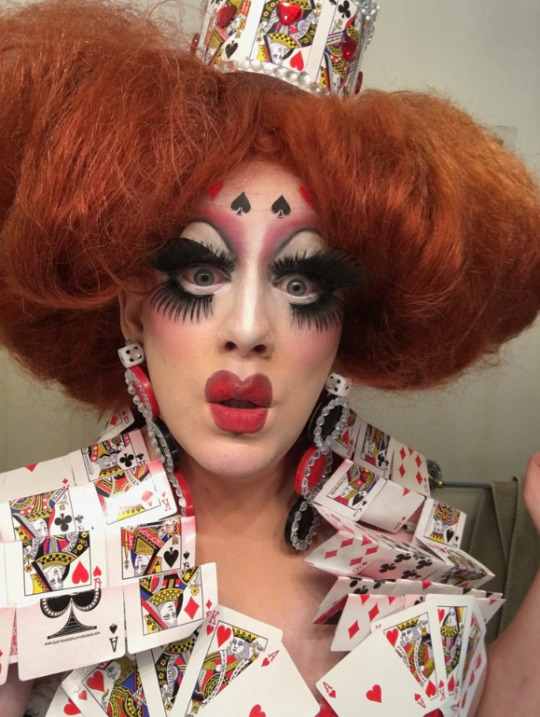
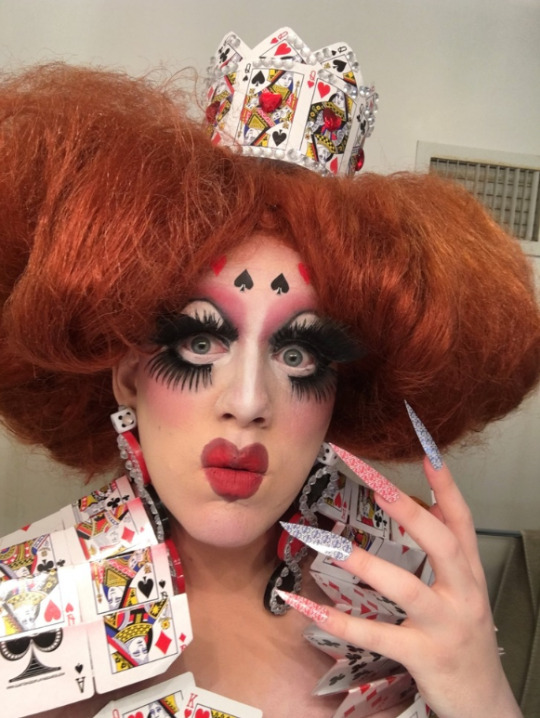
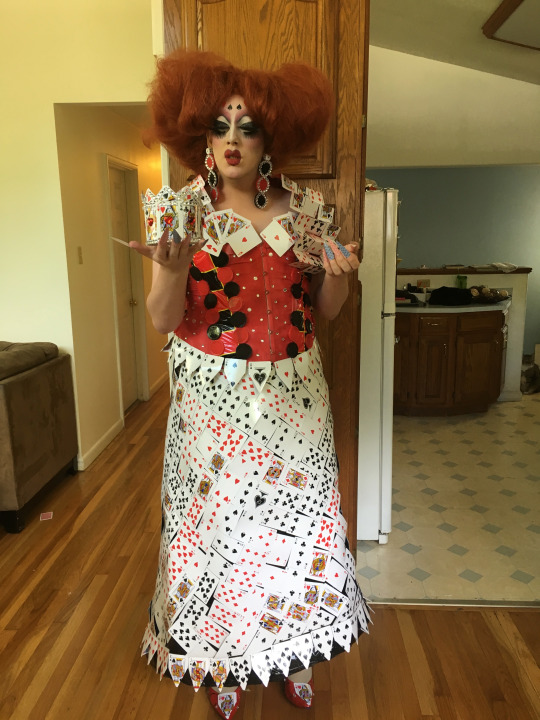
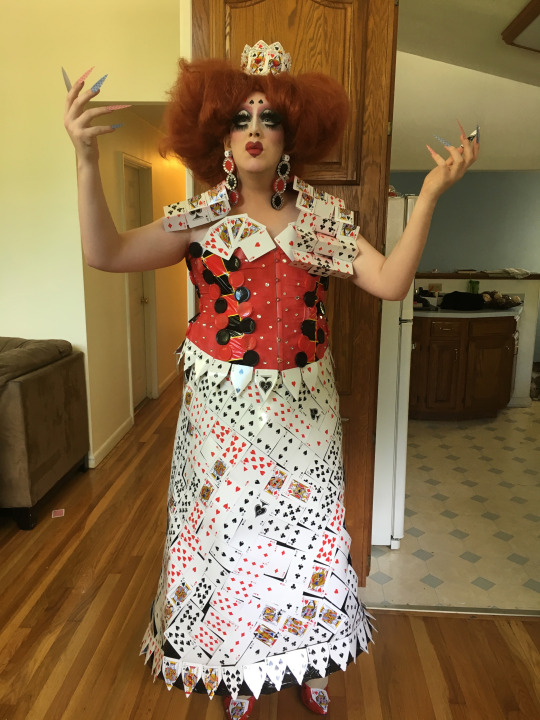
Lila: UGH! UGGGGGHHHHH! I am absolutely adoring this entire thing from head to toe. Every little piece has a detail, every little thought is so meticulously planned, and I live for it. Looking at this now, it’s no joke - what you’ve done in 7 months, across charm school, across this cycle, you’ve became this truly unstoppable force of powerhouse talent, and this outfit really stamps on the map how much you’ve progressed, from not even sewing at all, to becoming this powerhouse of DIY. Mary, I salute you.The ONLY THING - and it’s absolutely miniscule - your mushroom cut is doing the same as what happened to me - one of the hairs is flaring out making it off-kilter and once I noticed it, I’m like “ugh, this is glaring at me so much”. For your talent - I genuinely respect that you sat there, created a little scene and could master really singing without the camera’s audio clipping or distorting. You’re not the best singer, yes, but honestly, I was dancing to the song and having the occasional chuckle. I’m glad we didn’t get that stilted Weather Girl™ shot you’ve been criticised for in the past, and you kept me entertained for the entire video. I loved this, and you’re cementing yourself to be such a powerhouse in drag!
Letha: Analyse, the amount of work and detail that went into this look is honestly astounding. The playing card skirt, the accessories, the little crown, even the little nails, it's all so great and is a smart use of them materials. I think the stole/wrap would have worked better if it was just a piece on the shoulders, as it kind of closes you off. The hair has such great volume but I think the structure fell apart a bit from when you initially styled it. I will say I'm not loving the shape you've created, as it's a bit boxy. Either more flare from the skirt or more cinch from the corset would have helped define the silhouette a bit more. The makeup is very graphic and cartoony and is some of your best work of the cycle, as far as blending goes. Your talent video was hilARIOUS and very on brand for you, very Quirky Dique Pigue. You have a good voice and the sing/speak style worked very well. All in all, you really impressed me with your work on this challenge!
Toni: 301’S ON THE BOTTOM I C O N I C!!!! I really like this look, I think it was smart to take a character for inspiration and build the look around that. I love that from head to toe you used unconventional materials, even down to the brows and nails, so props for creative use of uncon. I do wish you had a bit more shape and a bigger bottom skirt for this look because it really would have pushed that wow factor for me. I also think you could have benefited from a staff or a scepter The wig is a big rough on one side and I wish you had taken the time to fix that up. Onto your makeup I live that you used 301’s on the bottom, and cards as the brows.You did a good job of keeping your makeup from getting muddy but I do wish you had lined your lips with a darker color. Onto your talent I think you really picked a strong talent, along with a strong song choice that really showed off who you are as queen!! I think it could have been done with a little editing such as the parts where its like you jumping from conversation to conversation. You could have easily edited that to have a fade between each one just to have it make more sense.
Gluttoni: This look is an ace Analyse and you look like a fucking QUEEN! This is the type of tedious, detailed work that makes fashion great. And my sweet you look fucking great. I’m such a fan of classic fairytales and I’m obsessed with your nod to the Queen of Hearts. You really excel in whimsical fantasy looks. The hair looks very grand so congrats on the styling of that and the makeup with card accents are great tie ins to this extravagant look. All in all, I loved the styling of this look. The only this is that I compare it to past looks that have done exactly like this but otherwise this a finished, polished look. Your talent! WOW. I’m not too versed in musical culture besides the one that let me keep my gay card intact but miss lady, YOU DID THAT. I was fully immersed in what you were doing. The set up was simplistic yet effective and I loved the concept beyond words because we’ve all had that awkward Tinder date before. Excellent work in showing us the fact you are multitalented. You went off with these other girl’s head.
Avana Noir
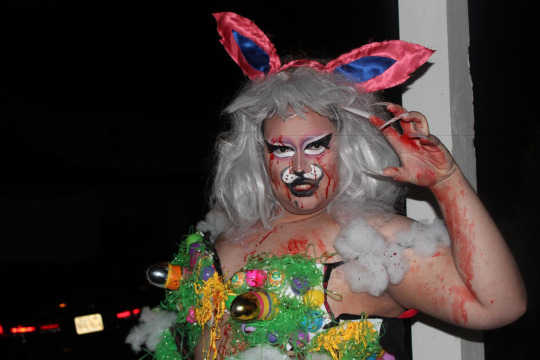
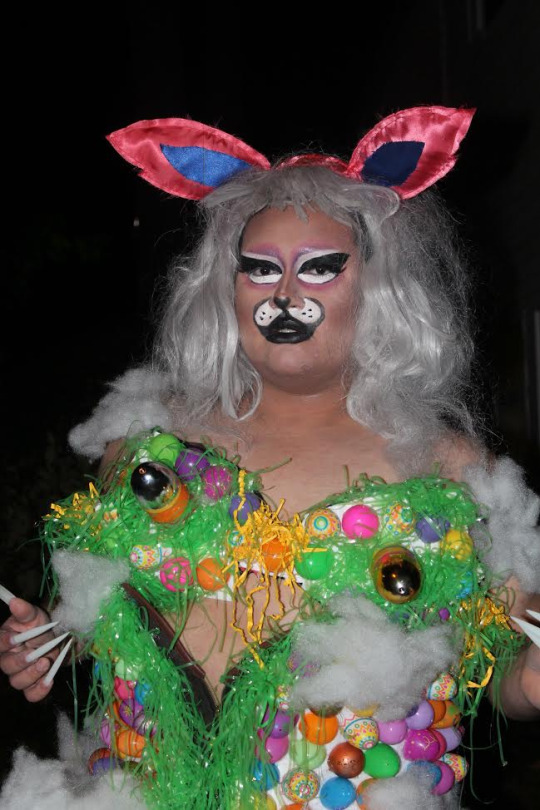
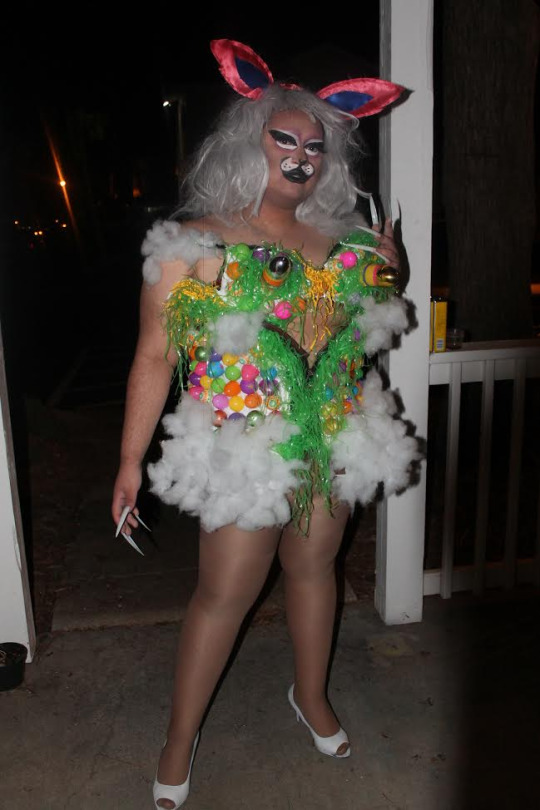
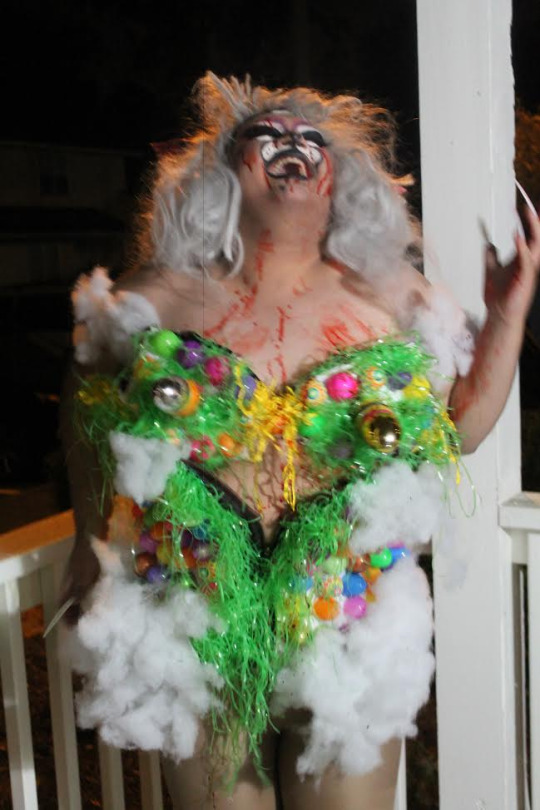
Lila: Wow. Wow, wow, wow. This is above and beyond, and I’m loving this concept a lot. It kind of has this twisted element of like Wonderland meets Final Fantasy meets the Cloud District, and the animals kill all the civillians and you’re killing your ex husband and the fucking full body shot of you with the blood - wow. The blood must be mine after this - that wig is not doing this concept any justice for me. It’s such a lovely colour and it’s those bangs. If you rat combed through it, really detangle it and get it as flat as you can, it would work - because the volume and the raggedy anne of it bar the bangs fit this concept super well, it’s just those bangs - you could’ve done an egg head dress if you wanted the illusion of it looking lace frontal-y and teased it out even more just so the volume stayed, but honestly - that’s just a nitpick. Overall, really cute and a great execution from yourself! Your talent was kind of a little bit here there and everywhere - I know how much of a videographer you are and editing is one of your strongest talents, and for me, there were standout moments, however there were still cracks in what could have otherwise been something really special and showcase-y. It reminds me of those really upclass OOTD videos that are on YouTube, and the only things that could be improved are the set dressing, and perhaps less shaky camera work. All in all, this was extremely fun to watch!
Letha: Hey bitch, it's Avana Noirrrrrrrrr!!!! You are serving straight up Playboy Easter Bunny, and the sex appeal works to balance out the shape of the middle, which could be argued is a bit bulky, but works as whole. I think a tiddy contour could have helped add some definition, though. I love the theme you went with, you better GET that Easter shit on clearance and make a look out of it. The makeup is fun, but a bit sloppy/messy in some places. I know you were going for a bit of a horror vibe here, but I think if there had been some sfx work over a flawless base it would have worked better than just smudging it. The wig is quite frankly a WRECK, but I like the nails and ears. I was confused a bit by your talent when I first saw it, but looking at it as an example of film it's pretty well done. Good job!
Toni:Lets start with your talent. BET. I thought that was a really smart way to do you talent and to give the judges a good look at your makeup and clothes. I love how in the first part you connected the first look to the second and then it had that huge mood shift. I wish you found a way to connect the second to the third because I think that was really cool and made it seem more professional. I think that this look is really cool and super out of the box for you. It was smart to tack the easter supplies that were on sale and sue them that way you got more bang for your buck. I think you could have painted the nails to look like little carrots and that would have been really cool. You also needed some form of strap to really hold everything in place on your shoulders. I think the makeup is very cute and very fitting, but that wig is rough girl. I think if you had styled the bangs down to hide that harsh line you would have been better off.
Gluttoni: Avana! You made it my love. This look is fucking amazing. I love anything cute and dark and you are giving me that! I love that you are giving us Easter feels for this springtime finale. The easter egg bodice almost had me stumped when you mentioned it but you really turned it as far as construction and execution goes. This is very good look and you should be proud of all the work you put in this because it shows. Your talent left me wanting a little more. I get what you were going after but it really just didn’t hit me over the head with feels y’know?
Lexi Lamour
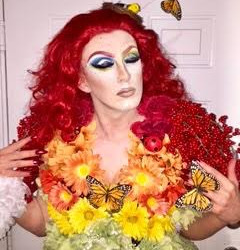
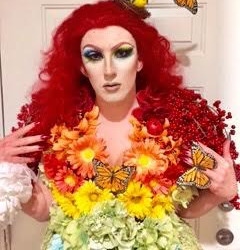
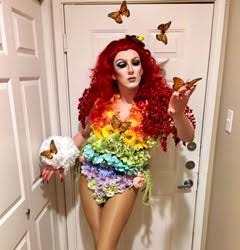
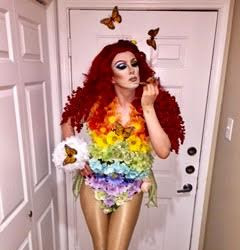
Lila: Your pictures this week are a little hard to make out, but either way, your costuming is absolutely spot on. This is extremely amazing work, honestly. It shows how much effort you can really put into something and it’s just so great to see this crazy flower rainbow display. The colours work so well in this and it’s just an exciting mix. The only thing that I would really change is the hair’s length, the length is sort of swallowing you up and it would’ve been much more perfection if the hair was a little short or pinned up. Your talent was kind of hit-and-miss for me. I don’t brand myself a comedy queen but I’m an embarrassment and also tragique, but some of the jokes could’ve landed a lot better. The sound was kind of swallowing your recording up a lot more too - Some elements were just off and for me, really, the funniest part was at the end when you showed some goofiness. I think it’s because there’s not much of that crack into being “goofy” so the jokes come across rather as a story than jokes. All in all, this category was good for you.
Letha: Lexi, a flower after my own heart. Obviously I love me a good flower look, and the way you combined both the flowers and the colors to make a rainbow is really great. I love the butterfly accents as well as the cloud/bird's nest, and the bright red hair is GREAT, it makes for a really cool gradient blend into the outfit. My only critique would be that the color of your tights kind of throws me, but I know how hard it can be to match them so that's understandable. I think the makeup is very pretty, but I feel like you could have done a bolder lip to keep up with the oomph of the rest of the outfit. For your standup comedy talent video, I must admit I wasn't the biggest fan. There were a couple funny parts and some clever editing choices but all in all it was pretty flat. All in all, it was kind of a mixed bag for me, but I do LOVE the look!
Toni:Hey Lexi! So I really love this body suit with all the flowers, I love the colors on the front but then you turn around and on the back it’s something totally different!!! I think you’ve accessorized it well with the cuff and the butterflies but I do wish there there was something going on towards the bottom because it does get a bit top heavy with the shoulder pads (that I do love). I think the hair is beautiful and really fits the look. Your makeup has improved so much over the cycle and I think I like the eye done with blue more than they one done with yellow and this face would have been perfect if you had done them both that way. Onto your talent that was really funny! I got a lot of good chuckles out of that and it was clear that this is something you’ve practiced and worked on. I think what could have helped this best is by letting the jokes breathe a little and putting more air time in it so that the audience has time to get the jokes.
Gluttoni: Lexi, Lexi, LEXI! You are here to go out with motherfucking bang I see and I’m totally on board for it. You slayed crafting a look out of these materials and I couldn’t be more proud of your work. You look fantastic in red hair and the monarchs were an amazing touch. You look like a rainbow dream and the styling of this is something I didn’t quite expect from you but I must say I love it. Your talent is something else completely unexpected from you. I was on the floor laughing and I’m glad you can really make fun of yourself even through your trying time and that is the makings of a true queen.
Sugar Monroe
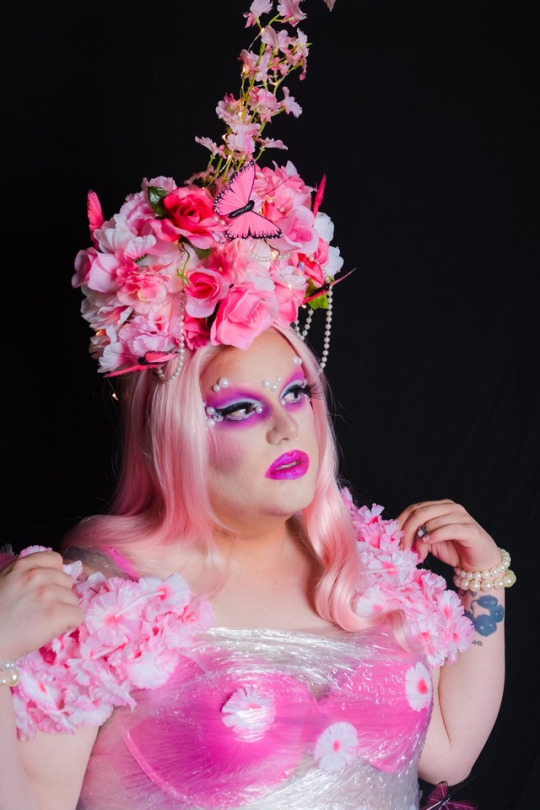
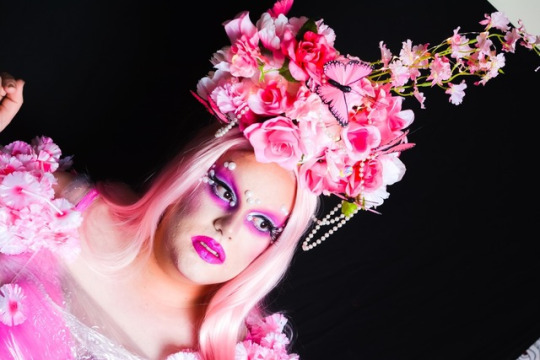
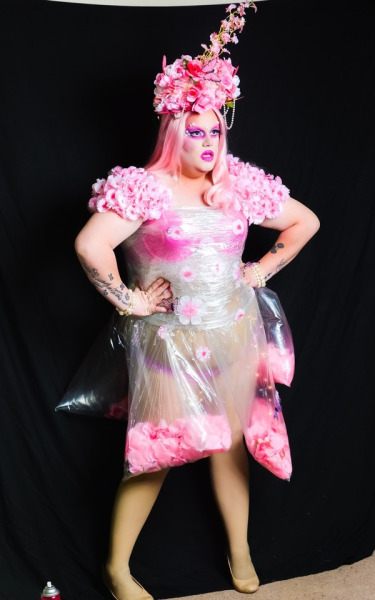
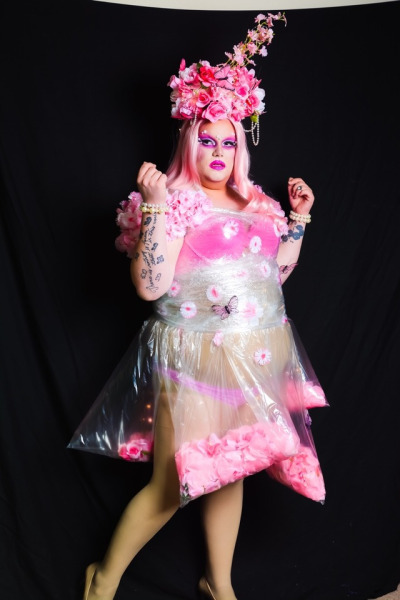
Lila: This by far is one of your strongest outfits you’ve created. I believe what you’re selling, the plastic is such a great fabric and because it is layered, it gives this nice effect of white kind of fibery fabric. The pink colour scheme is such a fun look and the entire headpiece is such a fucking strong point of interest. With that being said, where are your backlighting photos? I’m a little let down that there isn’t a light feature that you promised us, but that’s besides the point. I’m proud of this look, I think you should be too. Your talent on the other hand, ehh, it was alright. Alright in a way that I was expecting kind of a little bit more effort of a tally of you getting it wrong or right, maybe seeing the lyrics on screen whilst you sing the songs you were asked to do. You have such a beautiful voice and I’m really glad you always give us a listen to it - you’ve really given us such a great insight into what you can do this cycle and I’m so proud to see you shine where you can stand.
Letha: Sugar, I must say, of your three looks, this is the best put together, and my personal favorite. I would go so far as to say this is the most intricate one of your outfits has ever been. I wish you had done a pic with the tea lights more visible, as that would have been really cool (like in your runway), but I still really like it. Love the headpiece a lot, and the hair is simple but works well with the rest of the look. The makeup is also cute, I would've liked a bit more blending/softening around the edges of the eyes, though. For the talent portion, the singing was okay, but the organization of the video/editing was a bit of a mess. For about the last half, you're out of focus, which sucks, but at least the audio wasn't affected. With that in mind though, this is a solid submission and a testament to your growth throughout this cycle. Great job!
Toni: I think out of all your looks this one is easily my favorite. I think this is so beautiful and exciting to look at. It has so many different layers and textures, along with the lights, head piece, and styling of the with it all really just comes together for me. I really love this look from you. Onto your talent I think it was lacking a bit. The best parts of it for me was when you’d mess up and we’d get to see that spark of sugar humor, I loved that. I wish you had done more of that and just really worked your personality into this, or done another talent that had showcased your humor and personality it would have had a huge payoff.
Gluttoni: Much like all the other judges have said this is by far your crown and glory of all your looks. This outshines your queen look in the terms of being regal and royal looking. You look fucking ethereal in all honestly. I think you’ve had a very smart mindset in how to use your unconventional materials because they are very well placed. The headpiece is so ornate and beautiful so the straight hair fits well. The makeup is so good. I’d personally would add one more lighter color to blend edges out of the pink on the eyes. The talent aspect was just a dry for me although your singing was good. I definitely think you brought it in this category.
8 notes
·
View notes